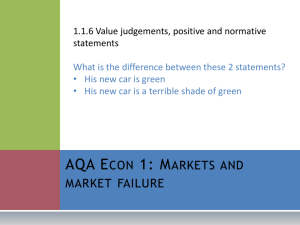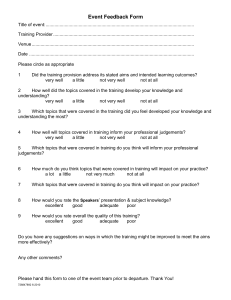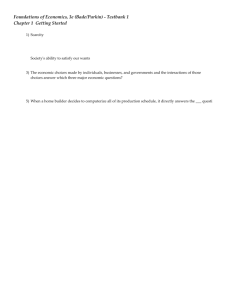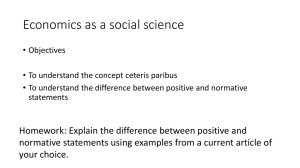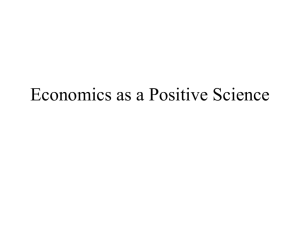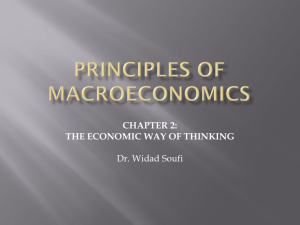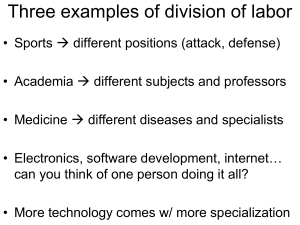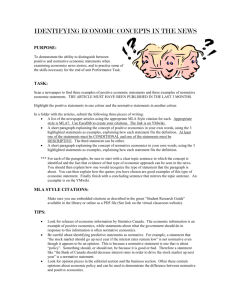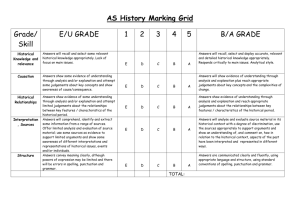File - LPS Business DEPT
advertisement
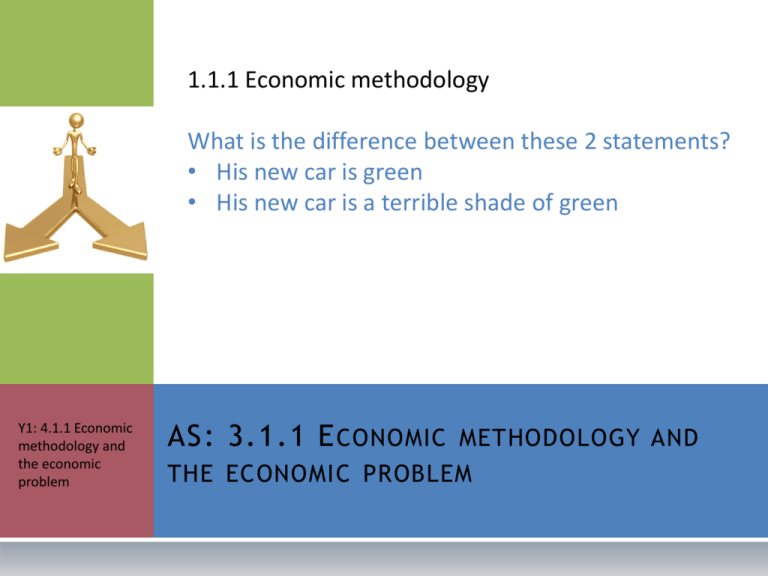
1.1.1 Economic methodology What is the difference between these 2 statements? • His new car is green • His new car is a terrible shade of green Y1: 4.1.1 Economic methodology and the economic problem AS: 3.1.1 E CONOMIC METHODOLOGY AND THE ECONOMIC PROBLEM 1.1.1 E CONOMIC METHODOLOGY Economics as a social science Similarities to and differences in methodology from natural and other sciences The difference between positive and normative statements How value judgements influence economic decision making and policy People’s views concerning the best option are influenced by the positive consequences of different decisions and by moral and political judgements You should understand how thinking as an economist may differ from other forms of scientific enquiry E CONOMICS AS A SOCIAL SCIENCE Economics is a social science This means that it looks at the way in which people interact and how they behave with each other Watch these ESCR video clips explaining social sciences S IMILARITIES TO AND DIFFERENCES IN METHODOLOGY FROM NATURAL AND OTHER SCIENCES Social sciences such as economics, psychology and sociology involve the study of human beings as individuals and groups and how we interact with each other Social science is often subject to personal prejudice and therefore, to some extent, is based on opinion Natural sciences such as maths, physics and chemistry involve the study of natural events and are objective They are based on facts provided by the evidence The laboratory of the natural scientist is one where they can control conditions Elements of a test are static and will always lead to the same result The laboratory of the social scientist is one where they cannot control conditions Elements of a test are dynamic and will often lead to different results C ETERIS . Think of any good or service. In pairs, explain how changes in variables e.g. price, incomes, fashion, the price of other products might impact on the demand for your good or service. PARIBUS In Economics we use the term ceteris paribus meaning ‘all other factors remain the same’ The study of Economics is like working in a laboratory. When Economists raise the price of a good or service they make the assumption that other factors e.g. consumer incomes do not change This allows us to identify the impact in changes of one variable e.g. price, on a second variable e.g. demand The economist will try to create conditions under which a change in one variable will lead to a change in a second variable by using the ceteris paribus principle For example, we might state that ceteris paribus, an increase in the price of bananas would lead to a decrease in their demand If other factors were to change e.g. a new report showing previously unknown life enhancing properties of bananas then this might not be the case. A rise in the price of bananas could occur at the same time as an increase in demand P OSITIVE Positive statements are impartial or unbiased. STATEMENTS Positive statements are objective, factually based comments that can be tested They are not influenced by the opinion or prejudice of people They allow scientific testing to take place that can be accepted or rejected For example, the unemployment rate is 8% is a positive statement because it is based on factual evidence Analysis should be based on positive statements i.e. they should be based on factual evidence. N ORMATIVE STATEMENTS Normative statements are partial or biased. Normative statements are subjective, questionable comments that are difficult to test Value judgements are opinions put forward by individuals that are difficult to test. They are influenced by the opinion or prejudice of people For example, the government should increase spending to help reduce the unemployment rate Normative statements require value judgements A value judgment is a statement that has been put forward by an individual that cannot be verified factually Many students use normative statements which undermine the validity of their arguments. Evaluation is based on value judgements. However, these judgements should derive from prior analysis. P OSITIVE AND NORMATIVE In pairs identify examples of when these professions use positive and normative statements. Positive Normative Politician News reporter Sports commentator Teacher Identify positive and normative statements used in this BBC news article. V ALUE JUDGEMENTS INFLUENCE ECONOMIC DECISION - MAKING AND POLICY Economic agents have to choose between alternative options For every decision made there is an opportunity cost Basing decision-making on positive statements is likely to lead to certain outcomes e.g. increasing the price of a normal good will reduce demand However, the future by definition, is uncertain This means that choices have to be made that will lead to uncertain outcomes Economic decision-making and policy are based on both positive economics and value judgements Q UICK TEST Which of the following is a positive statement a) The government should reduce the unemployment rate to below 7% b) The inflation rate has been above the government target of 2.0 % for over a year c) Society should take greater care of the elderly d) There needs to be a change of government to improve the performance of the economy Can you explain your answer? I NFLUENCES ON PEOPLE ’ S VIEWS CONCERNING THE BEST OPTION WHEN MAKING DECISIONS People’s views concerning the best option are influenced by: the positive consequences of different decisions This will depend on the subjective nature of the outcome. Normative statements are based on value judgements and it is not always easy to clearly see whether one option is better than another e.g. should the UK remain in the EU? moral and political judgements The best option for an individual may differ than that of the best option for society as a whole. The extent to which self-interest is the best way to meet the needs of society is an emotive subject To what extent would you make sacrifices to help meet the greater needs of society as a whole? P OSITIVE AND NORMATIVE STATEMENTS Write one positive and one normative statement about: Today’s lesson The UK economy Your favourite sports team
